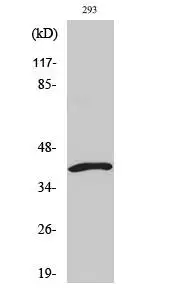
WB analysis of 293 cell lysate using GTX86959 ICAD (cleaved Asp224) antibody.
ICAD (cleaved Asp224) antibody
GTX86959
ApplicationsWestern Blot, ImmunoHistoChemistry, ImmunoHistoChemistry Paraffin
Product group Antibodies
ReactivityHuman
TargetDFFA
Overview
- SupplierGeneTex
- Product NameICAD (cleaved Asp224) antibody
- Delivery Days Customer9
- Application Supplier NoteIHC-P: 1:50~1:100. *Optimal dilutions/concentrations should be determined by the researcher.Not tested in other applications.
- ApplicationsWestern Blot, ImmunoHistoChemistry, ImmunoHistoChemistry Paraffin
- CertificationResearch Use Only
- ClonalityPolyclonal
- ConjugateUnconjugated
- Gene ID1676
- Target nameDFFA
- Target descriptionDNA fragmentation factor subunit alpha
- Target synonymsDFF-45, DFF1, ICAD, DNA fragmentation factor subunit alpha, DFF45, DNA fragmentation factor 45 kDa subunit, DNA fragmentation factor, 45kDa, alpha polypeptide, inhibitor of CAD
- HostRabbit
- IsotypeIgG
- Protein IDO00273
- Protein NameDNA fragmentation factor subunit alpha
- Scientific DescriptionApoptosis is a cell death process that removes toxic and/or useless cells during mammalian development. The apoptotic process is accompanied by shrinkage and fragmentation of the cells and nuclei and degradation of the chromosomal DNA into nucleosomal units. DNA fragmentation factor (DFF) is a heterodimeric protein of 40-kD (DFFB) and 45-kD (DFFA) subunits. DFFA is the substrate for caspase-3 and triggers DNA fragmentation during apoptosis. DFF becomes activated when DFFA is cleaved by caspase-3. The cleaved fragments of DFFA dissociate from DFFB, the active component of DFF. DFFB has been found to trigger both DNA fragmentation and chromatin condensation during apoptosis. Two alternatively spliced transcript variants encoding distinct isoforms have been found for this gene. [provided by RefSeq, Jul 2008]
- ReactivityHuman
- Storage Instruction-20°C or -80°C,2°C to 8°C
- UNSPSC12352203

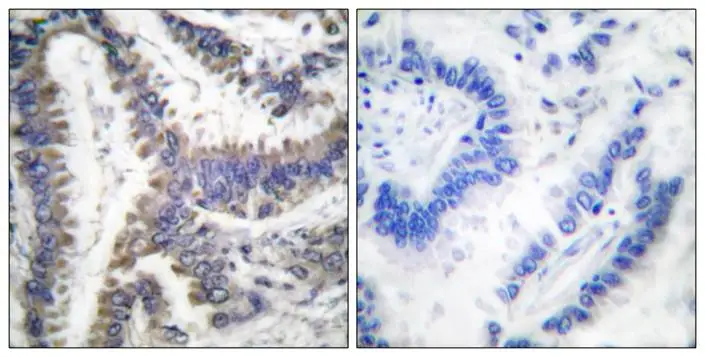

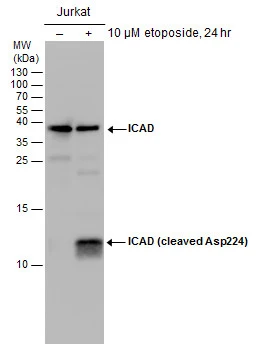
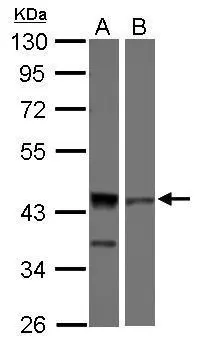
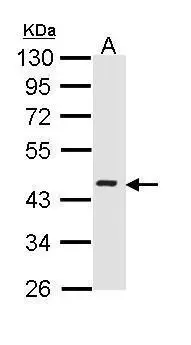
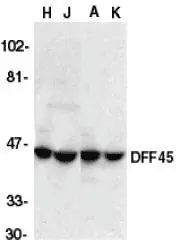
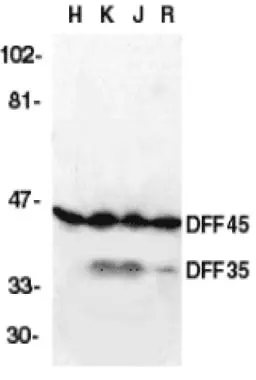
![WB analysis of various cell lines using GTX84620 ICAD antibody [3F12]. Loading : 35 ug per lane](https://www.genetex.com/upload/website/prouct_img/normal/GTX84620/GTX84620_4507_WB_w_23061420_289.webp)
![WB analysis of HEK293T cells transfected with ICAD plasmid (Right) or empty vector (Left) for 48 hrs using GTX84621 ICAD antibody [5C4]. Loading : 5 ug per lane](https://www.genetex.com/upload/website/prouct_img/normal/GTX84621/GTX84621_4509_WB_w_23061420_266.webp)